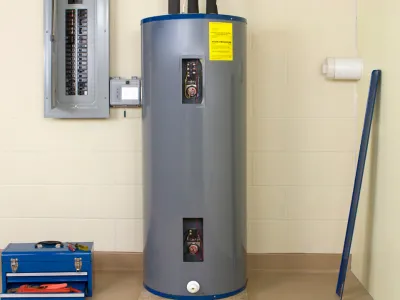Working with a Contractor: Heat Pump Water Heaters

Published November 7, 2024
Heat Pump Water Heaters are an all-electric, efficient option to heat your home water and help you move away from gas. Take a look at our step-by-step guide for installing a heat pump water heater in your home, including information about rebates and incentives to make the appliance more affordable.
The guidance below is intended to help consumers identify potential incentives and to position themselves to make fully informed decisions about equipment options. In some cases, consumers may find themselves eligible for multiple incentives based on equipment recommendations that meet their water heating needs and their budget constraints. In other situations, a consumer may opt to install equipment that may not meet requirements for incentives, but still meet their water heating needs within their budget goals. Every situation will be different. CUB’s goal is to help ensure consumers understand their options upfront, so they don’t inadvertently miss out on cost savings because they weren’t aware of an incentive requirement or didn’t know what questions to ask.
Pre-Work
1) Different types of water heaters (storage tank versus on-demand) can operate on different types of fuel (natural gas, propane, or electricity) and can even operate at different times of day (all day versus off-peak). These differences can impact your energy bill. If you are interested in purchasing and installing a heat pump water heater or an electric resistance water heater, develop a general understanding of how your energy bills may shift. Depending on your current water heater fuel type, it may cost you less, more or about the same amount of money to operate.
- Research whether your electric utility provides any discount programs for water heating, such as off-peak water heating. Off peak water heating programs tend to be compatible with traditional, larger electric resistance water heaters, rather than heat pump water heaters. Heat pump technology does not work well with power interruption.
2) Determine, potentially with your tax preparer, if you will have the tax liability necessary to take advantage of the IRA tax credits. The Clean Energy Resource Teams provides examples of claiming a tax credit.
3) To proceed with replacing your water heater, identify potential contractors. Inquire with companies about their experience and understanding of heat pump water heaters and other types of water heaters. It will be important to talk to contractors familiar with the technology.
- It is good practice to shop around and get more than one bid. Getting at least three estimates from different contractors is common.
Working with a contractor
1) Talk to the contractors about which equipment options will best meet your needs. This can include:
- addressing your water heating needs
- water heater placement options in your home (space constraints)
- meeting your budget constraints
- layout of the home (how far water must travel)
- the number of household members
- peak demand times for water
2) As desired and possible, ask for multiple equipment options that could vary in terms of costs, required prep-work, efficiency level, operational costs, etc. Some of these options may or may not be eligible for incentives.
- Consider space requirements needed for a heat pump water heater to operate effectively.
- If you currently have a natural gas water heater and want to switch to electric, understand what professionals may be needed if you need to seal off a natural gas line and/or upgrade electric outlets to handle an heat pump water heater.
- Consider various water heater models. For example, 120 volt heat pump water heaters generally cost more compared to a 240 volt heat pump water heater, but can operate on a standard outlet, reducing the potential need for electrical work.
3) Ask potential contractors about their awareness/knowledge of federal, state, local, and utility incentives.
- Does your utility have requirements to work with specific contractors to be eligible for their incentives? Is your potential contractor on the list?
- Do they know which equipment options are eligible for which incentives?
- Will they help you with any of the paperwork?
- Will they provide detailed receipts that prove eligibility?
4) Identify which incentives you are eligible for based on equipment.
- Here is a list of federal tax credit eligible equipment provided by the Consortium of Energy Efficiency, Inc.
- Research your local utilities rebate offerings. Determine equipment requirements and whether you need to work with specific contractors to be eligible for rebates.
- Research whether your local government provides any additional incentives, including financing
- Watch for details on federal IRA Rebates that will be administered by the State of Minnesota Department of Commerce. Rebates are anticipated to be available sometime in 2025.
5) Sign contracts/agreements for water heater installation.
- Make sure any necessary prep work has been completed based on the contractor’s recommendations. For example: If you haven’t previously owned an electric water heater, have they verified that your electrical panel can manage the additional power demand? Do you need to upgrade your outlet to meet the voltage requirements of a new water heater?
- Understand who is responsible for securing and paying for any needed building permits.
- Confirm if you or the contractor will be submitting paperwork for rebates
- Ensure you have the appropriate paperwork to use for taxes
6) Finish filling out any paperwork for rebates and submit before deadlines. In the case of a tax credit, keep the necessary paperwork for filing your taxes.